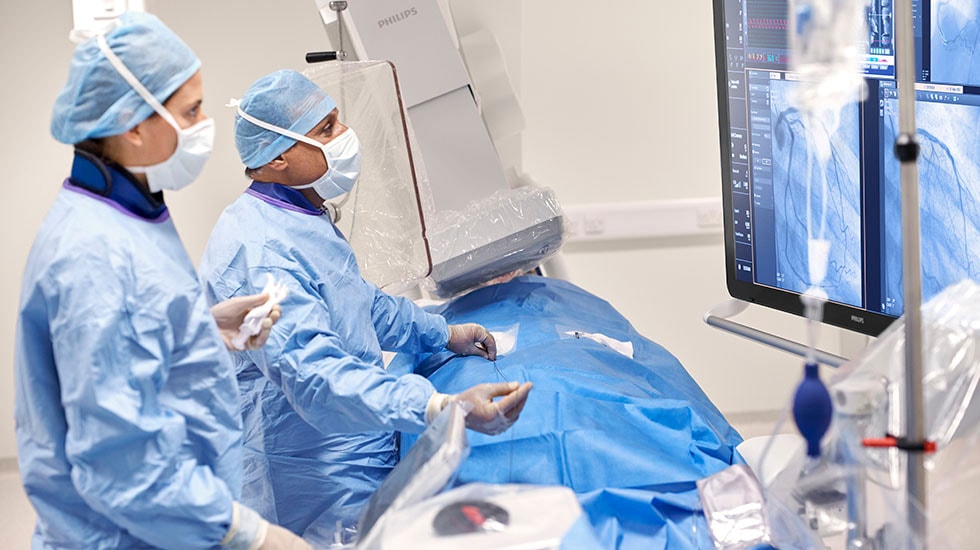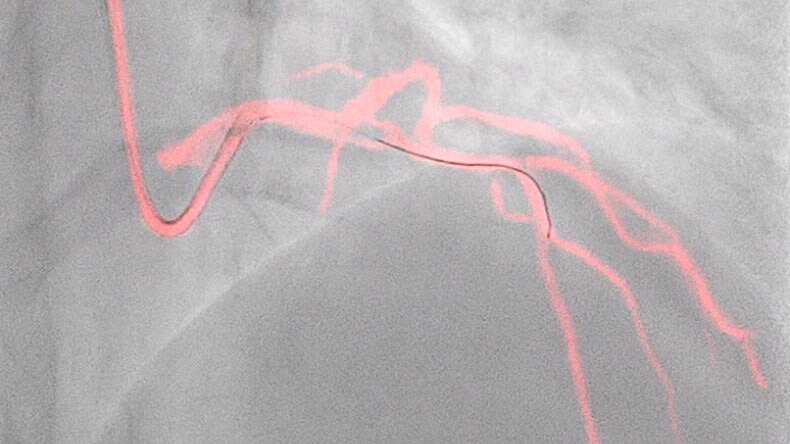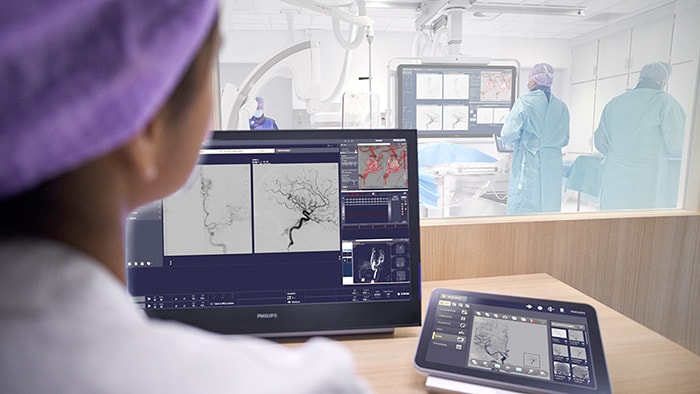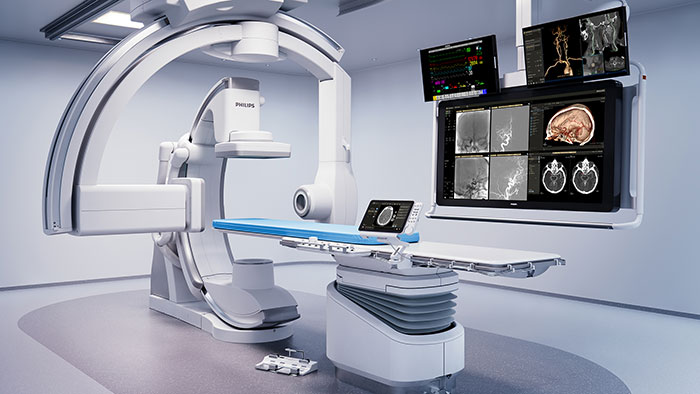Real-world evaluation of DCR4Contrast trial further supports benefits of Philips’ Dynamic Coronary Roadmap during percutaneous coronary interventions
May 27, 2025 | 5 minute read
Coronary artery disease (CAD) is the most frequent type of heart disease affecting millions of people worldwide. It is caused by chronic inflammation of the coronary arteries, which may lead to gradual obstruction of a coronary artery, or a sudden occlusion caused by the formation of a blood clot. In either case, the blood flow is restricted, depriving the heart muscle of a sufficient oxygen supply. Symptoms may include chest pain or shortness of breath, or a heart attack when a complete blockage of the blood flow occurs. Percutaneous coronary intervention (PCI) is an image-guided, minimally invasive procedure that is widely used to treat CAD by opening a blocked artery.

Percutaneous coronary intervention
PCI involves guiding a catheter, inserted via a small incision in the patient’s groin or wrist, through the patient’s blood vessels to the coronary artery of interest in order to open the blockage. During the procedure, interventional X-ray imaging systems are used to provide images of the blood vessels and enable the clinician to guide the catheters and devices during the intervention.
X-ray imaging of blood vessels, also known as angiography, requires the injection of iodine-based contrast media into the arteries to make them visible in the X-ray images. This method has been used by interventional cardiologists ever since the inception of PCI almost 50 years ago. However, there are safety limits for the amount of contrast media that can be administered to patients during PCI. This may hamper the ability of clinicians to perform long, complex PCI procedures. Additionally, patients with chronic kidney disease are very sensitive to iodine-based contrast media, which may worsen their already impaired renal function.
Dynamic Coronary Roadmap for Contrast Reduction (DCR4Contrast) clinical study
Philips is a leader in image-guided minimally invasive therapies focused on innovating existing procedures and enabling new ones. Some of these developments focus on reducing PCI’s dependance on angiography.
The Dynamic Coronary Roadmap for Contrast Reduction (DCR4Contrast) clinical trial was the largest ever multicenter trial to investigate the ability of Philips’ Dynamic Coronary Roadmap (DCR) tool to reduce the total volume of iodine-based contrast media administered during PCI procedures. From 2019 to 2023, this prospective randomized controlled trial was conducted across 6 centers in Europe, the US, and Israel and included 365 patients. Philips’ DCR tool enhances interventional X-ray imaging by overlaying a pre-acquired coronary angiogram (a contrast-enhanced X-ray image of the coronary arteries) onto real-time, zero-contrast interventional X-ray imaging (that visualizes the position of the catheter) and keeping the overlay accurately registered to movement of the patient’s heart.

DCR creates a real-time view of the coronary arteries and positioning of the catheters. Using it, interventionists can continuously see the coronary arteries together with the catheter trajectory, without having to use additional contrast media injections. Importantly, iodine-based contrast media impose a burden on the kidneys, posing the potential risk of contrast-induced acute kidney injury (CI-AKI). Reducing this risk is essential as PCI procedures become more complex.
The study found that use of the DCR tool to enhance navigation of the catheter reduced the total iodine contrast volume needed per procedure by an average of 28.8% (95% Confidence Interval: 18.9%, 38.2%), as well as reducing the number of angiograms per procedure by an average of three runs based on a procedure with an average of 11 runs – a 26.3% reduction (95% Confidence Interval: 16.8%, 35.1%).
Secondary analysis
In conjunction, the clinicians performing the procedures were also asked to report a great deal of secondary data, including the patient’s comorbidities, kidney function, and prior cardiac events and treatment, as well as an objective measure of procedure complexity and a subjective Dynamic Coronary Roadmap imaging score. The analysis of this secondary data was the basis of the latest findings published in the March 2025 issue of the Journal of the Society for Cardiovascular Angiography & Interventions (JSCAI).
Researchers analyzed the secondary data from the trial to assess the feasibility of obtaining coronary roadmaps with adequate quality for PCI guidance in a real-world context. They also evaluated the correlation between roadmap quality and contrast media usage, as well as the interaction between procedure complexity and the contrast reducing ability of DCR.
For 97% of the procedures performed, the involved interventionist rated the dynamic coronary roadmap clinically useful. The analysis also revealed that the proportion of roadmaps scored as ‘good’ or ‘very good’ and the percentage contrast media saving achieved (compared to performing the procedure without DCR guidance) both increased with procedure complexity.
Complex procedures typically involve the acquisition of more angiograms, each of which adds to the total contrast media dose. The secondary analysis results suggest that the higher contrast media saving achieved for complex PCI procedures – up to 40% – could therefore allow interventionists to achieve better revascularization of severely degraded cardiac arteries before the patient’s safe contrast media limit is reached. The results also suggest that use of Philips’ DCR tool has the potential to enhance the safety and efficacy of treatment for the complex coronary artery conditions interventionists increasingly see in patients.
“Enabling physicians to decrease contrast administration during procedures with tools like DCR could make a significant contribution to both the safety and quality of PCI. This is important at a time when PCI is increasingly used in patients with a complex clinical or anatomical profile,” said Prof. Javier Escaned, MD, Head of the Interventional Cardiology Section at Hospital Clinico San Carlos (Madrid, Spain) and Principal Investigator of the DCR4Contrast trial.
"I think contrast nephropathy or acute kidney injury related to contrast is the biggest challenge in complex coronary disease. As we get to more complex and older patients with high rates of underlying chronic kidney disease, this is a very simple tool that saves us,” said DCR4Contrast investigator John Messenger, MD, of the University of Colorado Anschutz Medical Campus (Aurora, CO, US).
The full JSCAI paper detailing the secondary analysis results can be viewed here.
Several large, randomized Philips-sponsored studies are currently underway in interventional cardiology including the GPS DEFINE trial and the recently started RADIQAL trial as part of its long-standing commitment to evidence-based innovation.
The opinions and clinical experiences presented herein are specific to the featured physicians and featured patients and are for information purposes only. The results from their experiences may not be predictive of all patients. Individual results may vary depending on a variety of patient-specific attributes and related factors. Nothing in this presentation is intended to provide specific medical advice or to take the place of written law or regulations. Results are specific to the institution where they were obtained and may not reflect the results achievable at other institutions.









